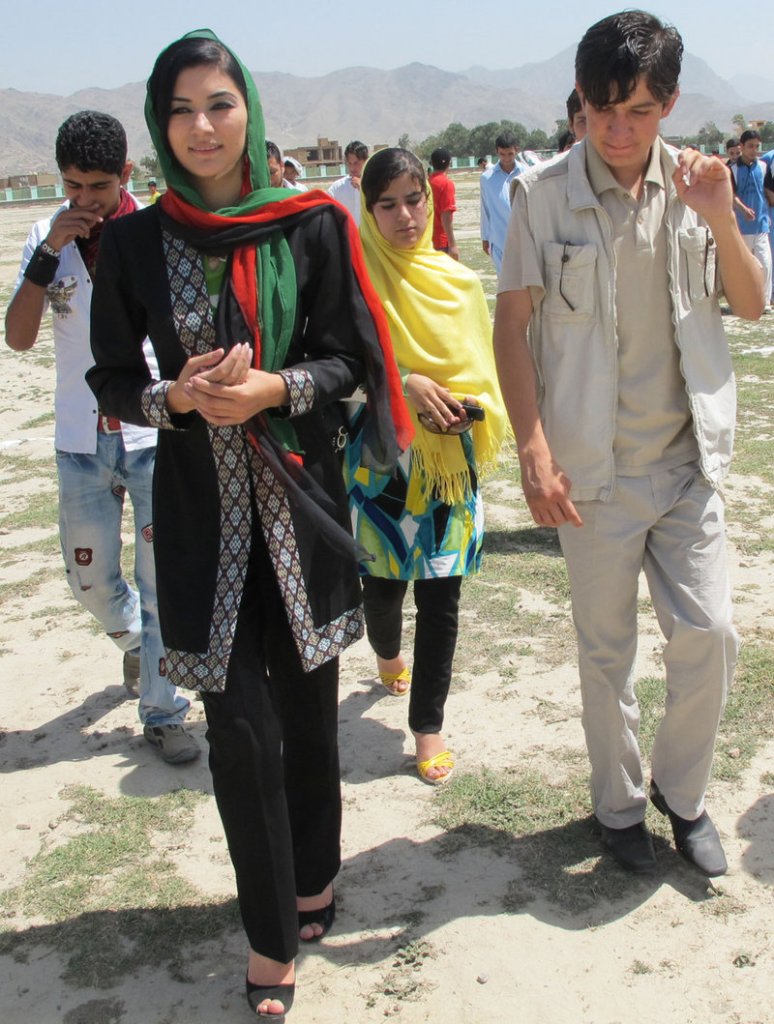KABUL, Afghanistan – Amid the warlords, ex-mujahideen fighters, hard-line clerics and shady businessmen running for a seat in the Afghan parliament, Robina Jalali, a 25-year-old candidate from Kabul, offers a more inspiring biography.
Raised during a Taliban regime that was brutal toward women, Jalali nevertheless trained as a sprinter and, after the Taliban fell, followed her passion to the Olympics. No matter that she finished second-to-last in the 100 meters in Athens in 2004 and last in Beijing in 2008. In Afghanistan, a conservative Muslim nation where many women still wear the identity-shielding burqa, Jalali’s story is like a fairy tale.
Now comes the sequel: Jalali is running again — for a seat in the Wolesi Jirga, the lower house of the Afghan parliament. Though interest among women was initially sparse, a recruitment drive from the Independent Election Committee has resulted in a record 406 female candidates standing in the Sept. 18 elections for at least 64 seats reserved for women under the Afghan constitution, which guarantees them 25 percent of the 249 seats. (More than 2,000 men are running.)
But these women, including business executives, civic activists and nonprofit workers, report daily threats from the Taliban and other insurgent groups. In late August, five campaign workers of outspoken parliament member Fawzia Gilani, who is running for re-election in Herat, were kidnapped and killed.
“I don’t care about the Taliban because I’m used to it,” Jalali said in her office, fortified by an iron gate but with no armed security guards. A framed picture of President Hamid Karzai greeting her after the 2008 Games is displayed on her desk.
“In the beginning, when I started in the sports world, I got all these threatening leaflets from the Taliban thrown at my house,” she said. “I was only girl running with men. Everybody would say things to me. After running, on my way back home, I used to cry and think, ‘Why can’t I be like the men?’“
Being treated like their male counterparts has not been easy for the female members of parliament, who have been ignored, shouted down or worse. In 2007, male legislators voted to suspend Malalai Joya, a 32-year-old legislator from Farah province who delivered a rebuke against corrupt warlords on the parliament floor. She went into hiding and remains so three years later, choosing not to run for re-election.
“It was very easy in parliament to attack women and say they are not Muslim, or not a good Muslim,” said Sima Samar, chairman of the Afghanistan Independent Human Rights Commission. “It was intimidation.”
Jalali is unperturbed. She remains single in a culture in which women marry young, saying she would not be free to pursue political office if she had a husband.
Her platform focuses on equal rights for women and youth, and she angrily recounted an incident in November 2008 in southern Afghanistan when two schoolgirls were blinded after men threw acid in their faces.
Like many girls, Jalali and her seven sisters (she also has two brothers) were secretly tutored at home during the Taliban era. At 16, she resumed school when the Taliban fell from power in 2001. She also pursued running, training barefoot or in sandals, then in cheap Chinese sneakers, on the track at Kabul Stadium, where the Taliban had executed prisoners.
Her father, Haji Jamaludin, was a businessman in the computer industry, traveling to Dubai and China. He recalls a young Robina telling him, “Do not consider me a woman. Consider me as a son.”
“I let her go out and do sports,” Jamaludin said. “I ignored all the comments of people who told me not to allow my daughter to travel outside Afghanistan, that as a woman it was a disgrace.”
Copy the Story Link
Send questions/comments to the editors.



Success. Please wait for the page to reload. If the page does not reload within 5 seconds, please refresh the page.
Enter your email and password to access comments.
Hi, to comment on stories you must . This profile is in addition to your subscription and website login.
Already have a commenting profile? .
Invalid username/password.
Please check your email to confirm and complete your registration.
Only subscribers are eligible to post comments. Please subscribe or login first for digital access. Here’s why.
Use the form below to reset your password. When you've submitted your account email, we will send an email with a reset code.